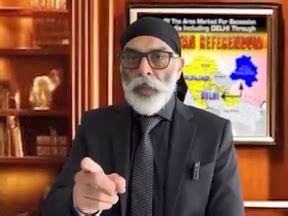
FIRST READING: India presses Canada to deal with another alleged Khalistani terror threat
“We are asking Sikhs not to fly Air India on 19th November … it can be life-threatening,” Gurpatwant Singh Pannun, head of the separatist group Sikhs for Justice, said in a recent video address.
Sikhs for Justice, a group that has been banned in India since 2019, advocates for an ethno-religious Sikh nation known as Khalistan to be carved out of the Indian state of Punjab.
The Air India reference has particularly galled Indian politicians and media outlets given that it was Khalistani extremists based in Canada who staged the 1985 Air India bombing.
Pannun is based in New York, but he’s a Canadian citizen whose group has been active within Canadian Sikh communities. Just last month, Pannun was quoted in the CBC after Sikhs for Justice organized an unofficial Khalistani independence referendum in Surrey, B.C.
One of the voting stations was Guru Nanak Sikh Gurdwara, where Hardeep Singh Nijjar – a Khalistani nationalist listed as a terrorist by the Indian government – was murdered in a targeted killing in June.
It was that killing which Prime Minister Justin Trudeau claimed in September was an assassination organized by the government of Indian Prime Minister Narendra Modi. Or, as Trudeau told the House of Commons, “Canadian security agencies have been actively pursuing credible allegations of a potential link.”
The gurdwara where Nijjar was killed now features a large billboard outside with the words “assassination wanted” against portraits of three Indian diplomats based in Canada. The group Sikhs for Justice, meanwhile, is depicted as an arm stabbing an assault rifle labelled “India.”
In response to the Pannun video, India has asked Canada to step up security for Air India flights leaving Toronto and Vancouver. Last week, the RCMP and Ministry of Transport both confirmed they were investigating the video as a potential terror threat.
In September, another video by Pannun sparked condemnation from Canadian politicians after he called on Hindus to leave Canada en masse. “Indo-Hindus who work against the interests of Canada have effectively repudiated their allegiance to Canada,” he said.
In a statement at the time, Dominic LeBlanc, Canada’s minister of public safety, said the “circulation of an online hate video targeting Hindu Canadians runs contrary to the values we hold dear as Canadians.”
As regards his Air India video, meanwhile, Pannun has said in a statement that he was simply calling for a boycott of the airline, and that his “life-threatening” comment should be interpreted indirectly.
“Every dollar that goes to Indian businesses is used to perpetuate existential threat to Sikhs,” he said.
A new Leger poll has uncovered the unsurprising result that Canadians want the federal government to remove the carbon tax on all forms of home heating, rather than just the rare forms of home heating that disproportionately affect Liberal ridings in Atlantic Canada. What’s unexpected about the poll, however, is that the margins are still pretty close. Just 57 per cent “want carbon tax relief for all home heating.” And in Quebec, that drops to 50 per cent. Considering that taxes never fare all that well in polls, this could be argued as a surprisingly high vote of confidence in the carbon tax.
It’s extraordinarily rare that foreign countries will cite Canada as a model on anything (aside from niche issues like snow management and oil sands extraction). But there have been some scattered examples in recent years where a foreign legislator has cited us as an example of what not to do. In June, a British parliamentary committee studied Canada in order to learn what not to do in legalizing assisted suicide. And in recent testimony to the Australian Senate, conservative Senator Alex Antic (who confusingly represents the country’s Liberal Party), said Canada should be a warning as to why Australia should avoid digital ID. Specifically, Antic referenced “the financial cancellation” of Freedom Convoy leaders who had their assets and bank accounts frozen as part of the opening move of the federal government’s effort to evict their Ottawa blockades.
ood bank usage is absolutely through the roof this year. A new report by Toronto’s Daily Bread Food Bank said they may rack up three million food bank visits by year’s end – roughly double what it was last year. Grocery inflation is obviously a factor (not to mention endlessly spiking rents), but food banks also say they are increasingly being relied upon by recently arrived refugee claimants or foreign students. In the latter case, this has even led to instances in which Ontario food banks have banned foreign students outright, or issued statements to local colleges informing students that food banks are only for emergencies. This is also where we should mention that the federal government currently advises foreign students to plan for non-tuition living expenses of $833 per month – a laughably inadequate number in Canada’s usual university towns.
Source » nationalpost.com





